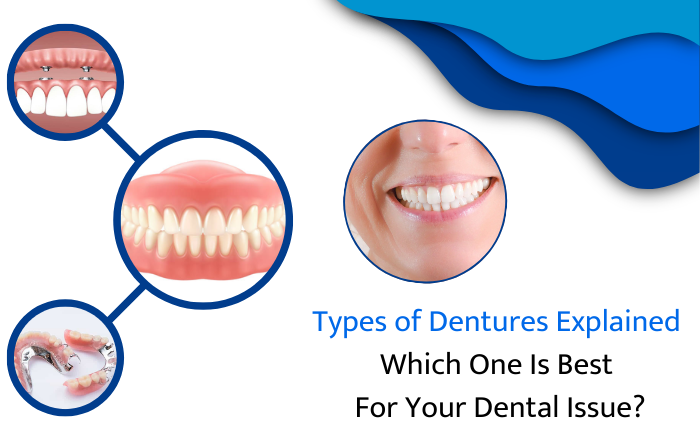If you’re struggling with missing teeth and looking for a solution to regain your smile, dentures might be the perfect choice. Dentures have been a trusted option for years, offering a way to improve chewing and speaking while restoring confidence. However, with so many types available, it can be challenging to decide which one is right for your needs. This blog will help you understand the different types of dentures, their benefits and factors to consider. For those in Katraj, you can visit Dr. Umesh Tambe at Royal Dental Care Clinic to enquire about your options.
– What Are Dentures?
Dentures are removable appliances designed to replace missing teeth and surrounding tissues. They help restore functionality, improve appearance, and make daily activities like eating and speaking easier. Dentures can offer a practical and effective solution, whether you’ve lost one tooth or several.
– Types of Dentures Explained
1. Full Dentures
Full dentures, also known as complete dentures, are used when all teeth in the upper or lower jaw are missing. They are custom-made to fit your gums and provide a natural appearance.
Benefits:
Replace an entire arch of teeth.
Improve the ability to eat and speak.
Considerations:
It may take time to adjust to wearing them.
2. Partial Dentures
Partial dentures are ideal for those who still have some natural teeth remaining. They consist of replacement teeth attached to a gum-colored base, supported by a metal or plastic framework.
Benefits:
Fill gaps between natural teeth.
Prevent other teeth from shifting out of position.
Considerations:
Regular cleaning and maintenance are important to prevent gum issues.
3. Immediate Dentures
These dentures are placed immediately after teeth extraction, providing an instant solution while your gums heal.
Benefits:
Avoid the inconvenience of being without teeth during healing.
Considerations:
It may need adjustments as gums shrink during the healing process.
4. Implant-Supported Dentures
These dentures are supported by dental implants, which are surgically placed into the jawbone. They offer a secure fit and improved functionality.
Benefits:
Provide better stability compared to traditional dentures.
Feel more like natural teeth.
Considerations:
Require a healthy jawbone and additional procedures for placement.
5. Custom Dentures
Custom dentures are specifically crafted to match your individual features, offering a natural appearance and improved comfort.
Benefits:
Designed for a snug fit and better appearance.
Considerations:
May involve a higher cost compared to standard options.
6. Snap-In Dentures
These dentures are secured using dental implants or anchors, making them easy to remove and clean.
Benefits:
Provide better stability and comfort.
Ideal for those with enough healthy bone structure.
Considerations:
Initial procedures may take time.
-Factors to Consider When Choosing Dentures
- Dental Health: The type of dentures you need will depend on your oral health.
- Budget: Some options are more affordable than others.
- Lifestyle needs: Consider how often you’ll be wearing them and your level of activity.
- Aesthetic Goals: Some dentures offer a more natural look.
-Benefits and Drawbacks of Dentures
Benefits:
Improve chewing, speaking, and overall appearance.
Boost self-confidence by restoring your smile.
Drawbacks:
Regular maintenance is required to keep them in good condition.
Some types may take time to adjust to.
Read More Blog – Home Remedies For Sensitive Teeth
-How to Care for Your Dentures
- Clean your dentures daily using a soft toothbrush or denture cleaner.
- Avoid using hot water as this can warp the material.
- Remove your dentures at night to allow your gums to rest.
- Store them in a denture solution to keep them moist.
- Schedule regular dental checkups to ensure a proper fit.
-Frequently Asked Questions About Dentures
1. Can I eat normally with dentures?
Yes, though it may take some time to adjust. Start with soft foods and gradually move to harder textures.
2. Are there any foods I should avoid with dentures?
While you can eat most foods, it’s best to avoid sticky, hard, or chewy foods that might damage or dislodge your dentures.
3. How often should I visit a dentist for denture maintenance?
Regular dental visits every six months are recommended to ensure your dentures fit well and your gums remain healthy.
Choosing the right type of dentures is an important step in improving your dental health and quality of life. Whether you need full dentures, partial dentures, or implant-supported options, understanding your needs and preferences will help you make the best decision.
If you’re looking for a trusted Dentist in Katraj, Dr. Umesh Tambe at Royal Dental Care Clinic can guide you through the process. Visit the clinic to discuss your options and take the first step toward a confident smile.

